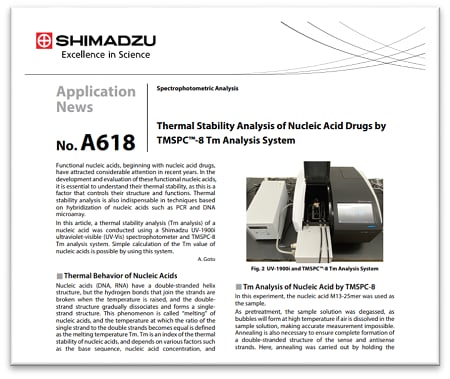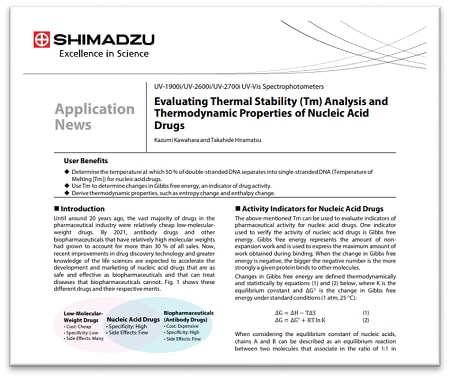This Is The Power Of AI - Discover LabSolutions MD Now
Tm measurement and thermodynamic parameter analysis

Thermal Stability Analysis of Nucleic Acid Drugs by TMSPC™-8 Tm Analysis System
Nucleic acids (DNA, RNA) have a double-stranded helix structure, but the hydrogen bonds that join the strands are broken when the temperature is raised, and the double-strand structure gradually dissociates and forms a single-strand structure. This phenomenon is called “melting” of nucleic acids, and the temperature at which the ratio of the single strand to the double strands becomes equal is defined as the melting temperature Tm. Tm is an index of the thermal stability of nucleic acids, and depends on various factors such as the base sequence, nucleic acid concentration, and mismatch (non-complementary base pairs). It is known that nucleic acids have an ultraviolet absorption peak at around 260 nm, and their absorbance at 260 nm increases when melting occurs. The Tm analysis system of the spectrophotometer determines the Tm value by measuring this change in absorption. In this article, a thermal stability analysis of a nucleic acid was conducted using an ultraviolet-visible (UV-Vis) spectrophotometer and Tm analysis system.
Evaluating Thermal Stability (Tm) Analysis and Thermodynamic Properties of Nucleic Acid Drugs
Tm can be used to evaluate indicators of pharmaceutical activity for nucleic acid drugs. One indicator used to verify the activity of nucleic acid drugs is Gibbs free energy. Gibbs free energy represents the amount of non-expansion work and is used to express the maximum amount of work obtained during binding. When the change in Gibbs free energy is negative, the bigger the negative number is the more strongly a given protein binds to other molecules. In this article, changes in the thermodynamic indicators enthalpy, entropy, and Gibbs free energy were calculated from Tm values obtained by UV-Vis spectrophotometry and the activities of nucleic acid therapeutics were evaluated.




